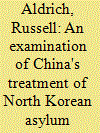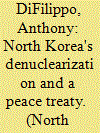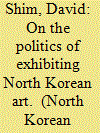|
|
|
Sort Order |
|
|
|
Items / Page
|
|
|
|
|
|
|
| Srl | Item |
| 1 |
ID:
106319


|
|
|
|
|
| Publication |
2011.
|
| Summary/Abstract |
Every year thousands of North Koreans illegally cross into China to escape the abject poverty and oppression that is endemic in their home country, and many are captured by Chinese authorities and returned to their homeland where they face harsh repercussions. To avoid culpability under international law, China maintains that the North Koreans are not refugees but rather "economic migrants," and that therefore they do not qualify for protection under the 1951 United Nations Convention Relating to the Status of Refugees. This paper examines this argument and concludes that it is invalid.
|
|
|
|
|
|
|
|
|
|
|
|
|
|
|
|
| 2 |
ID:
106321


|
|
|
|
|
| Publication |
2011.
|
| Summary/Abstract |
The future of the two Koreas has a great influence on the security landscape of Northeast Asia. Because of this, an exploration of a variety of future possibilities regarding the rapidly changing Korean Peninsula and preparation for a sudden change is timely in order to avoid any catastrophic result. This article suggests two likely scenarios for the future of the two Koreas and assesses these two by exploring critical uncertainties that lie ahead. It argues that internal conditions, such as the North's nuclear weapons program, its ongoing political transition process, and the policies of regional powers such as the United States, are the most important factors in determining future outcomes on the Korean Peninsula. Based on a thorough exploration of these critical uncertainties, it concludes that policy-makers of the South Korean government and regional powers should take seriously the possible North Korean collapse scenario, while making every effort to promote peace on the Korean Peninsula by creating a stable North Korea.
|
|
|
|
|
|
|
|
|
|
|
|
|
|
|
|
| 3 |
ID:
106318


|
|
|
|
|
| Publication |
2011.
|
| Summary/Abstract |
Themain goal of this paper is to analyze the increasing North Korean dependence on China and provide policy recommendations to deal with it. In the first section, the reality of North Korea behind the rhetoric of "self-reliance" during the cold war is analyzed. In the second section, the rising North Korean overdependence on China is investigated as a new reality between the two countries after the collapse of the Soviet Union. Overdependence comes at the price of vulnerability, a price that Pyongyang dearly paid when Beijing squeezed its vulnerable points during the nuclear crisis. In the third section, the vulnerability of North Korea is analyzed. After experiencing the tightening grip of China, Pyongyang is having second thoughts about its relationship with China. In the fourth section, North Korean efforts to distance itself from Beijing are investigated. Finally, policy recommendations are discussed in the conclusion of the paper to alleviate the North Korean overdependence on China.
|
|
|
|
|
|
|
|
|
|
|
|
|
|
|
|
| 4 |
ID:
106323


|
|
|
|
|
| Publication |
2011.
|
| Summary/Abstract |
North Korea has a powerful national narrative which is based on struggle against external forces. Since the mid-nineties, this has been centered on sacrifice for the sake of military strength. Recently, however, this narrative arc has been shifted: Now the people are to be rewarded by the central government for years of sacrifice with improvement to quality of life. The 2009 currency reform, rather than simply a failure, was an integral part of the strategy to deliver this improvement by 2012. China's continued support for Pyongyang's plans to develop infrastructure and expand trade, combined with the national narrative, gives this development plan a reasonable chance to succeed.
|
|
|
|
|
|
|
|
|
|
|
|
|
|
|
|
| 5 |
ID:
106317


|
|
|
|
|
| Publication |
2011.
|
| Summary/Abstract |
This short paper examines the issue of the continued absence of a peace treaty to end the Korean War. Although the hostilities associated with the Korean War ended in 1953, it was the "temporary" Armistice Agreement and not a formal peace treaty that did this. After reviewing the history of discussions on a peace treaty, this paper focuses on the current North Korean nuclear issue. It demonstrates that a conditional peace treaty is a very pragmatic way to end the Korean War and to determine if Pyongyang, as it has stated repeatedly, wants to forsake its nuclear weapons, the programs it uses to produce them, and thus to denuclearize the Korean Peninsula. A conditional peace treaty, which effectively is win-win diplomacy for Washington and Pyongyang, will also improve the security environment in Northeast Asia and lay the political ground for improved relations between the two Koreas and between North Korea and Japan.
That no peace treaty was ever created to end the Korean War since the fighting was stopped by an armistice in 1953 has been one of the major sources of instability in Northeast Asia, where there still exists the very the palpable residual of the Cold War. The armistice was meant to end the hostilities on the Korean Peninsula only until a permanent peace treaty could be negotiated. More than a half century later, this has not happened. A peace treaty linked to North Korea's denuclearization gives the Obama administration a new and viable option with which to fundamentally change the security environment in Northeast Asia.
|
|
|
|
|
|
|
|
|
|
|
|
|
|
|
|
| 6 |
ID:
106325


|
|
|
|
|
| Publication |
2011.
|
| Summary/Abstract |
Northeast Asia consists of China, Japan, the two Koreas, the Russian Far East, and Mongolia. Korea is the country where the interests and influences of the four big global powers-China, Russia, Japan, and the United States-are closely interlocked. The peninsula has functioned as a land bridge between the Asian continental powers (China and Russia) and the oceanic powers (Japan and the United States) for both cultural exchange and military aggression. However, this land bridge has been broken since the end of World War II because the peninsula has been divided into two separate states, North Korea and South Korea.
|
|
|
|
|
|
|
|
|
|
|
|
|
|
|
|
| 7 |
ID:
106327


|
|
|
|
|
| Publication |
2011.
|
| Summary/Abstract |
This essay was written in reaction to the international symposium "Exploring North Korean Arts," which was held on the occasion of the art exhibition "Flowers for Kim Il Sung-Art and Architecture from the DPR Korea," in Vienna on September 3 and 4, 2010. The essay argues that scholars must recognize the significance of visual imagery in their approaches to issues, actions and events related to North Korea. Further, the commentary reviews some of the symposium's discussions and explores the political and ethical implications of whether North Korean self-representations are legitimate pieces of art or mere propagandistic instruments.
|
|
|
|
|
|
|
|
|
|
|
|
|
|
|
|
|
|
|
|
|